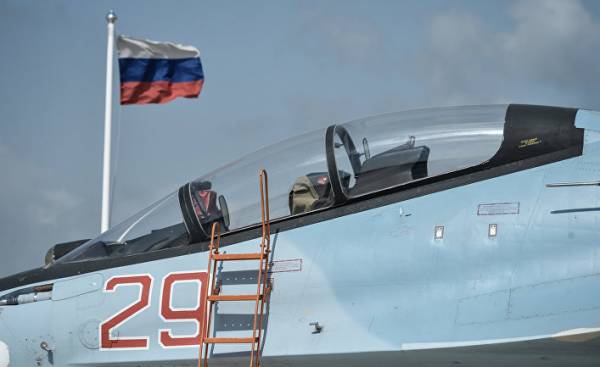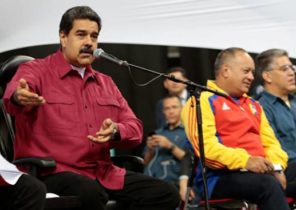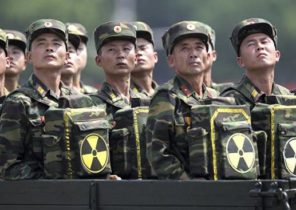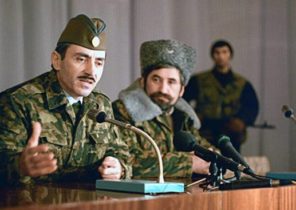
Russia expanded their operations in the Mediterranean region, especially in Syria. This contributed to the development of military and political crisis, the United States and weakened their credibility. Russia is playing better than their map of influence in the “war Vice” with great risk of a direct confrontation.
In mid-may the Russian black sea fleet conducted a “tactical exercises” with the use of landing craft for amphibious in the Mediterranean sea. Exercises can be seen as a response to the earlier NATO exercises in the same region for testing landing “against the illegal conduct of persons across borders against terrorists of ISIS (an organization banned in Russia, ed.).”
These exercises indicate the extension of Russia’s actions in the middle East that was shown seriously in 2015, when Russia entered into the Syrian conflict by sending military equipment there, and about 4 000 soldiers. The positions of ISIS and al-Nusra (a group banned in Russia, ed.) fired missiles from ships of the black sea fleet in the Mediterranean sea. The black sea fleet uses the port city of Tartus, and the aircraft placed at a military air base in Latakia Hamim.
These actions can also be seen as a response to the direct intervention of the United States began bombing in 2014. And in November 2015, then President Obama (Obama) has officially sent the first ground part to Syria to “to give advice and help the rebels that are fighting ISIL.” Before his departure Obama has brought the number of soldiers sent there to about 500.
SENDING NEW SOLDIERS
In March this year, Donald trump (Donald Trump) sent 400 more soldiers in Manbij for “deterrence” and “creating security”. It is believed that the city is under the control of the Syrian democratic forces, an Alliance of Syrians and Kurds. Thus, Syria is at least 1,000 American soldiers.
Russia has repeatedly protested against such actions of the United States, the last time it was June 20, when Putin’s special representative for the Middle East Mikhail Bogdanov commented on the US military presence in the South of Syria: “This is completely illegal. No resolution of the UN Security Council or a request from the legitimate government of Syria. according to the principles of international law. We, on the contrary, are there at the invitation of the legitimate authorities”.
Russia, along with Turkey and Iran introduced a “peace plan” for Syria.
THE TERMINATION HOTLINE
Russian planes with the Syrian government forces conducted decisive operations that have resulted in a December 2016 release biggest city Aleppo from the terrorists of ISIL, al-Nusra and other groups. They were given the opportunity to leave the city. Several thousand fighters and their families on the buses were taken from the Eastern part of the city in the two cities of Idlib.
The coalition under US leadership with the Danish part in 2014 began bombing Syria. Although Russia in 2012 after the beginning of unrest in Syria has vetoed the international military intervention in that country, Russia and the United States concluded a provisional agreement on the hotline to prevent conflicts. After the United States 18 June this year the plane was shot down Syrian air force at the time refused to use this hot line.
The same thing happened when the US fleet in the Mediterranean sea on the orders of the President of trump (Trump) on 7 April this year released 59 Tomahawk missiles at the Syrian air base of al Sirat.
POISONOUS GAS
The pretext was the alleged chemical attack in Khan Shakun in Idlib province, where Syrian aircraft, according to a statement by trump used the “banned chemical weapons”. The Minister of foreign Affairs of Syria Walid al-Muallem (Walid al-Moualem) said that his government could not even think about using chemical weapons against “its own people”.
According to Russia, the Syrian planes struck the warehouse of chemical substances created terrorist groups to fight against the regime of Bashar al-Assad (Bashar al-Assad). While the Prime Minister of Denmark the Danish Prime Minister (Lars Løkke) praised trump for a missile attack on al-Sirat, even a number of Pro-Western journalists have wondered what benefit the government of Syria could have chemical attack.
Russian President Vladimir Putin called the U.S. reaction “violation of international law” and sent another frigate to the Syrian coast, where there had already been six ships of the fleet.
In the 2013-14 year, Assad’s government agreed to destroy its chemical weapons. Danish cargo ship took part in operation RECSYR when exported this weapon. Russian warships were escorting transport ships with chemical weapons.
After these events of April this year, the United States persistently opposed the participation in the investigation under the auspices of the UN that occurred in two scenes: in Khan Shakuni and al Sirat. But on June 26 the White house again said, without naming the source, “was discovered the potential of cooking” to a new Syrian chemical attack, and that the United States in this case will rigidly respond to the Assad regime.
Around the same time with the conflict, associated with chemical weapons, in April 2017, Russia withdrew many of its soldiers from Syria, leaving 2000 or maybe even less troops.
THE INCREASED TENSIONS
In February 2016, Putin issued a decree on the national security strategy of the Russian Federation. In contrast to the recently released report of the U.S. was included in the list of national threats.
This is due to not only expansion and military expansion of NATO to the East or the conflict in Ukraine, but also the fact that the Russian “independent policy on the world stage and domestically has caused to reciprocate, the US and its allies, which seek to maintain their dominance in the international arena. This, apparently, will lead to political, economic and military pressure.”
Russia already has a military air base in Latakia naval base in Tartus, in addition, has signed with the Assad government contract to develop oil fields in the Mediterranean sea off the Syrian coast. The Russian fleet, in addition, has access to the port of Ceuta in the Spanish protectorate under the Treaty with the government in Madrid and to the ports in Cyprus, whose financial sector is heavily dependent on Russian investment.







